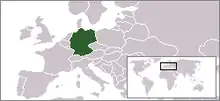Germania
English
Proper noun
Germania
Translations
Finnish
Pronunciation
- IPA(key): /ˈɡermɑːniɑ/, [ˈɡe̞rmɑːˌniɑ]
- Rhymes: -ɑːniɑ
- Syllabification(key): Ger‧ma‧ni‧a
Declension
| Inflection of Germania (Kotus type 12/kulkija, no gradation) | ||||
|---|---|---|---|---|
| nominative | Germania | (Germaniat) | ||
| genitive | Germanian | (Germanioiden) (Germanioitten) | ||
| partitive | Germaniaa | (Germanioita) | ||
| illative | Germaniaan | (Germanioihin) | ||
| singular | plural | |||
| nominative | Germania | (Germaniat) | ||
| accusative | nom. | Germania | (Germaniat) | |
| gen. | Germanian | |||
| genitive | Germanian | (Germanioiden) (Germanioitten) (Germaniainrare) | ||
| partitive | Germaniaa | (Germanioita) | ||
| inessive | Germaniassa | (Germanioissa) | ||
| elative | Germaniasta | (Germanioista) | ||
| illative | Germaniaan | (Germanioihin) | ||
| adessive | Germanialla | (Germanioilla) | ||
| ablative | Germanialta | (Germanioilta) | ||
| allative | Germanialle | (Germanioille) | ||
| essive | Germaniana | (Germanioina) | ||
| translative | Germaniaksi | (Germanioiksi) | ||
| instructive | — | (Germanioin) | ||
| abessive | Germaniatta | (Germanioitta) | ||
| comitative | See the possessive forms below. | |||
| Plural forms of this word are not commonly used, but might be found in figurative uses, in some set phrases or in colloquial language. | ||||
| Possessive forms of Germania (type kulkija) | ||||||||||||||||||||||||||||||||||||||||||||||||||||||||||||||||||||||||||||||||||||||||||||||||||||||||||||||||||||||||||||||||||||||||||||||||||||||||||||||||||||||||||||||||||||||||||||||||||||||||||||||||||||||||||||||||||||||||||||||||||||||||||||||||||||||||||||||||||||||||||||||||||||||||||||||||||||||||||||||||||||||||||||||||||||||||||||||||||||||||||||||||||
|---|---|---|---|---|---|---|---|---|---|---|---|---|---|---|---|---|---|---|---|---|---|---|---|---|---|---|---|---|---|---|---|---|---|---|---|---|---|---|---|---|---|---|---|---|---|---|---|---|---|---|---|---|---|---|---|---|---|---|---|---|---|---|---|---|---|---|---|---|---|---|---|---|---|---|---|---|---|---|---|---|---|---|---|---|---|---|---|---|---|---|---|---|---|---|---|---|---|---|---|---|---|---|---|---|---|---|---|---|---|---|---|---|---|---|---|---|---|---|---|---|---|---|---|---|---|---|---|---|---|---|---|---|---|---|---|---|---|---|---|---|---|---|---|---|---|---|---|---|---|---|---|---|---|---|---|---|---|---|---|---|---|---|---|---|---|---|---|---|---|---|---|---|---|---|---|---|---|---|---|---|---|---|---|---|---|---|---|---|---|---|---|---|---|---|---|---|---|---|---|---|---|---|---|---|---|---|---|---|---|---|---|---|---|---|---|---|---|---|---|---|---|---|---|---|---|---|---|---|---|---|---|---|---|---|---|---|---|---|---|---|---|---|---|---|---|---|---|---|---|---|---|---|---|---|---|---|---|---|---|---|---|---|---|---|---|---|---|---|---|---|---|---|---|---|---|---|---|---|---|---|---|---|---|---|---|---|---|---|---|---|---|---|---|---|---|---|---|---|---|---|---|---|---|---|---|---|---|---|---|---|---|---|---|---|---|---|---|---|---|---|---|---|---|---|---|---|---|---|---|---|---|---|---|---|---|---|---|---|---|---|---|---|---|---|---|---|---|---|---|---|---|---|---|---|---|---|---|---|---|---|---|---|---|---|---|---|---|---|---|---|
| ||||||||||||||||||||||||||||||||||||||||||||||||||||||||||||||||||||||||||||||||||||||||||||||||||||||||||||||||||||||||||||||||||||||||||||||||||||||||||||||||||||||||||||||||||||||||||||||||||||||||||||||||||||||||||||||||||||||||||||||||||||||||||||||||||||||||||||||||||||||||||||||||||||||||||||||||||||||||||||||||||||||||||||||||||||||||||||||||||||||||||||||||||
Ido
Pronunciation
- IPA(key): /ɡerˈmani̯a/
Derived terms
Related terms
See also
- (countries of Europe) lando di Europa; Albania, Andora, Armenia, Austria, Azerbaijan, Bielorusia, Belgia, Bosnia e Herzegovina, Bulgaria, Kroatia, Chipro, Chekia, Dania, Estonia, Finlando, Francia, Gruzia, Germania, Grekia, Hungaria, Islando, Irlando, Italia, Kazakstan, Latvia, Liechtenstein, Lituania, Luxemburgia, Macedonia, Malta, Moldova, Monako, Montenegro, Nederlando, Norvegia, Polonia, Portugal, Rumania, Rusia, San-Marino, Serbia, Slovakia, Slovenia, Hispania, Suedia, Suisia, Turkia, Ukraina, Unionita Rejio, Vatikano
Italian
Pronunciation
- IPA(key): /d͡ʒerˈma.nja/
- Rhymes: -anja
- Hyphenation: Ger‧mà‧nia
Related terms
Latin
Etymology
From Germānī + -ia. Germani was an exonym applied by the Romans to a tribe (or nearby tribes) living around and east of the Rhine; it was first attested in the 1st century b.c. works of Julius Caesar and is of uncertain etymology. It was said by Strabo to derive from germānus (“close kin; genuine”), making it cognate with "germane" and "german", but this seems unsupported. Attempts to derive it from Germanic or Celtic roots are all problematic.[1]
Pronunciation
- (Classical) IPA(key): /ɡerˈmaː.ni.a/, [ɡɛrˈmäːniä]
- (Ecclesiastical) IPA(key): /d͡ʒerˈma.ni.a/, [d͡ʒerˈmäːniä]
Proper noun
Germānia f sg (genitive Germāniae); first declension
- Germany in its various senses, including:
- (Classical Latin) the lands of the Germani, tribes living around the Rhine River in the 1st century b.c.
- (Medieval Latin) the lands of the Germans, sometimes inclusive of conquered areas in France, England, and Eastern Europe
- (New Latin) Germany, various Central European nation-states including the Holy Roman Empire, the German Empire, and the Federal Republic of Germany
Declension
First-declension noun, singular only.
| Case | Singular |
|---|---|
| Nominative | Germānia |
| Genitive | Germāniae |
| Dative | Germāniae |
| Accusative | Germāniam |
| Ablative | Germāniā |
| Vocative | Germānia |
Related terms
Descendants
References
- Oxford English Dictionary, 3rd ed. "German, adj. and n". Oxford University Press (Oxford), 2012.
Middle English
Etymology
From Old English Germania, from Latin Germania, q.v.
Romanian

Germania
Pronunciation
- IPA(key): /d͡ʒerˈma.ni.a/
Audio (file)
Related terms
Spanish
Pronunciation
- IPA(key): /xeɾˈmanja/ [xeɾˈma.nja]
- Rhymes: -anja
- Syllabification: Ger‧ma‧nia
Proper noun
Germania f
- (historical) Germania
- Hyponyms: Germania Inferior, Germania Magna, Germania Superior
This article is issued from Wiktionary. The text is licensed under Creative Commons - Attribution - Sharealike. Additional terms may apply for the media files.